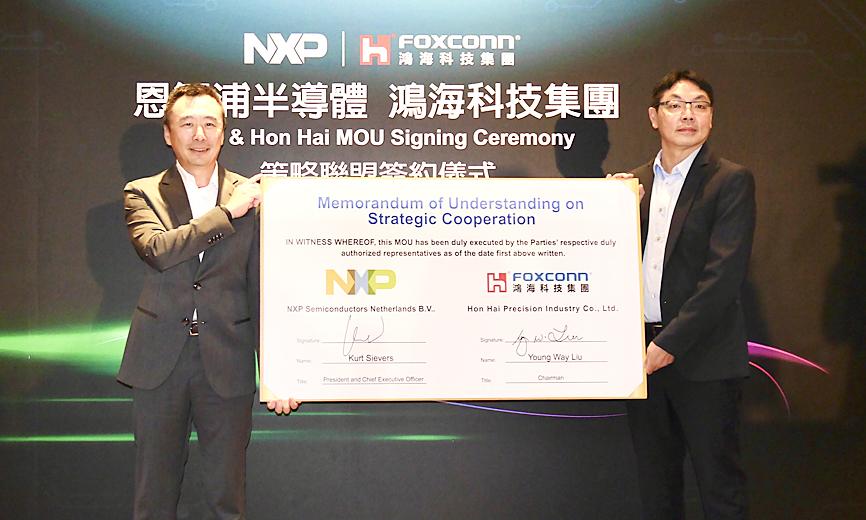Hon Hai Precision Industry Co (鴻海精密) on Wednesday said it is deepening its partnerships with automotive chip supplier NXP Semiconductors NV to adopt more chips and technologies in its next generation of electric vehicle (EV) development.
Hon Hai said it has adopted NXP chips in its first electric sedan, dubbed Model C, and plans to use more chips in two new electric models to be unveiled in October.
Hon Hai said it would ramp up production of the Model C in Taiwan in the first half of next year.

Photo: Fang Wei-jie, Taipei Times
Hon Hai’s EVs are developed by Foxtron Vehicles Technologies Co (鴻華先進), a joint venture between Hon Hai and Yulon Motor Co (裕隆汽車).
Hon Hai, the world’s largest iPhone maker, on Wednesday signed a memorandum of understanding with NXP Semiconductors to jointly develop platforms for a new generation of smart-connected vehicles.
The strategic partnership is to involve a broad suite of applications that includes more than 10 automotive products in its first stage, and is soon to begin development, the company said. That is different from NXP’s cooperation with Foxconn Industrial Internet Co Ltd (富士康工業互聯網) in developing smart cockpit solutions.
The collaboration between Hon Hai and NXP is also to include next-generation platforms such as cybersecurity, connectivity using the latest NXP S32 domain, and vehicle networking control, while also advancing secure car access with Bluetooth Low Energy and ultra-wideband, Hon Hai and NXP said in a joint statement.
NXP has also joined the MIH electric vehicle platform, an open platform initiated by Hon Hai.
Hon Hai aims to duplicate Taiwan’s success in the electronics sector in its efforts to build EVs, by swiftly integrating new technologies to introduce new hardware and other products, Hon Hai chief product officer Jerry Hsiao (蕭才祐) told reporters on the sidelines of a news conference in Taipei on Wednesday.
“The cooperation with NXP will allow us to engage in the development of new technologies and new solutions in the early stage of the collaboration, leading to shorter time-to-market,’ Hsiao said.
Such partnerships are crucial in developing next-generation vehicles, given that an open ecosystem significantly reduces manufacturing costs and shrinks time to market, he said.
That is different from conventional practice in the auto industry, where automakers operate their own closed supply chains, he added.

Taiwan’s technology protection rules prohibits Taiwan Semiconductor Manufacturing Co (TSMC, 台積電) from producing 2-nanometer chips abroad, so the company must keep its most cutting-edge technology at home, Minister of Economic Affairs J.W. Kuo (郭智輝) said yesterday. Kuo made the remarks in response to concerns that TSMC might be forced to produce advanced 2-nanometer chips at its fabs in Arizona ahead of schedule after former US president Donald Trump was re-elected as the next US president on Tuesday. “Since Taiwan has related regulations to protect its own technologies, TSMC cannot produce 2-nanometer chips overseas currently,” Kuo said at a meeting of the legislature’s

TECH WAR CONTINUES: The suspension of TSMC AI chips and GPUs would be a heavy blow to China’s chip designers and would affect its competitive edge Taiwan Semiconductor Manufacturing Co (TSMC, 台積電), the world’s biggest contract chipmaker, is reportedly to halt supply of artificial intelligence (AI) chips and graphics processing units (GPUs) made on 7-nanometer or more advanced process technologies from next week in order to comply with US Department of Commerce rules. TSMC has sent e-mails to its Chinese AI customers, informing them about the suspension starting on Monday, Chinese online news outlet Ijiwei.com (愛集微) reported yesterday. The US Department of Commerce has not formally unveiled further semiconductor measures against China yet. “TSMC does not comment on market rumors. TSMC is a law-abiding company and we are

FLEXIBLE: Taiwan can develop its own ground station equipment, and has highly competitive manufacturers and suppliers with diversified production, the MOEA said The Ministry of Economic Affairs (MOEA) yesterday disputed reports that suppliers to US-based Space Exploration Technologies Corp (SpaceX) had been asked to move production out of Taiwan. Reuters had reported on Tuesday last week that Elon Musk-owned SpaceX had asked their manufacturers to produce outside of Taiwan given geopolitical risks and that at least one Taiwanese supplier had been pushed to relocate production to Vietnam. SpaceX’s requests place a renewed focus on the contentious relationship Musk has had with Taiwan, especially after he said last year that Taiwan is an “integral part” of China, sparking sharp criticism from Taiwanese authorities. The ministry said

US President Joe Biden’s administration is racing to complete CHIPS and Science Act agreements with companies such as Intel Corp and Samsung Electronics Co, aiming to shore up one of its signature initiatives before US president-elect Donald Trump enters the White House. The US Department of Commerce has allocated more than 90 percent of the US$39 billion in grants under the act, a landmark law enacted in 2022 designed to rebuild the domestic chip industry. However, the agency has only announced one binding agreement so far. The next two months would prove critical for more than 20 companies still in the process